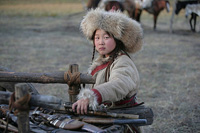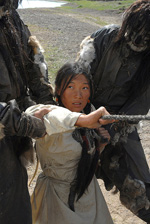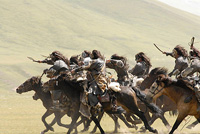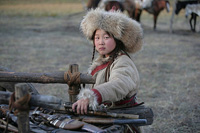Genghis Khan (meaning “universal ruler”) was the title given to the Mongol warrior Temujin, a 13th century tribal chief who echoed the accomplishments of Alexander the Great and founded an empire that swept across Central Asia, China, Russia, the Middle East and even Eastern Europe. Employing audacious battle strategies and novel cavalry tactics, he earned a reputation in history as both a brutal warmonger and a munificent administrator, subjugating millions while also expanding Mongol culture. His empire lasted more than 150 years after his death, and although the following centuries saw a decline in his empire, his last ruling descendent wasn’t deposed until early in the 20th century by Soviet forces.

Genghis Khan is one of those historical characters whose colorful exploits capture one’s imagination, especially that of boys. Award-winning Russian filmmaker Sergei Bodrov must have been one of those enchanted youngsters. His Mongol, which received an Oscar nomination for Best Foreign Film last year, is a vivid historical epic illuminating the life of Genghis Khan, attempting to separate the man from the mythology. The film succeeds as spectacularly as it fails, extrapolating a reasonable narrative from the sketchy details of Temujin’s early life while also completely ignoring the very things that made him so memorable.
Mongol begins with a nine-year-old boy whose father is taking him to visit a nearby encampment in order that the child might choose a wife. The young Temujin (Odnyam Odsuren) shows great political instinct and ruthless intuition, even as a youngster, going against his father’s wishes and choosing a headstrong girl who, unbeknownst to him at the time, will become his most devoted ally and trusted advisor. It is to be Temujin’s last moment of bliss for a very long time.

His father murdered by a rival nomadic tribe and his own right of succession spurned by countrymen who refuse to bow to so young a ruler, Temujin must flee for his life, hunted and enslaved across the years until he eventually returns home to claim what is rightfully his—his tribe, his wife and his honor—with the undeniable visage of a man (now played by Japan’s Tadanobu Asano). But destiny will not allow his rise to be an easy one. Temujin must fight, often gorily, for each and every victory. In the course of events, Jamukha (Honglei Sun), his dearest and oldest friend, becomes his deadliest enemy, clashing with his blood brother over dominance as Temujin imposes the rule of law on the wanton tribes of the Mongol lands.
Mongol is a Far East Braveheart, charged with the same sense of pseudo-history, movie heroics and inspirational grandeur. It won’t revolutionize the costume drama, but it does an impressive job of transporting us back to a distant land and exotic period in world history.
The film makes the most of its gorgeous (if much maligned, thanks to Borat) Kazakhstan setting, filling the screen with beautiful, painterly vistas that lend a real sense of the epic to the production. And they should—the film is shot in the terrain where the real action took place. Only at the end, during a mighty clash of armies, does the film lean on CG to beef up the natural world. It’s an unfortunate choice, given Mongol’s comfort level with reproducing as much of 12th century milieu as possible with practical effects. Still, the CG is phenomenal, and the tidal waves of men and horses are appropriately terrifying.

The film doesn’t rush into the violence (it doesn’t rush into anything) but certainly isn’t squeamish about splashing around in the gore once it gets around to it. Unlike the bloodless confrontations of Prince Caspian, death by sword in Mongol is appropriately messy, even if it is sensationalized for an increasingly bloodthirsty viewing culture.
No one can truly know what kind of man Genghis Khan was, but director Bodrov seems to take great lengths trouncing current historical interpretations. His Khan is not the monster some have made him out to be; instead, his protagonist is a man of compassion, fierce loyalty, spousal devotion and unashamed selflessness, a man who fights only when pushed into a corner. He is tough but not fierce, formidable but not despotic. He is a new kind of Khan and man, the film seems to suggest—someone so singularly devoted to his bride and family that he will even take as his own those children his wife bore from rape.
Whether or not this squares with the historical record I’ll leave to the scholars. Either way, this Genghis Khan may not fit your preconceptions. He has no apparent faults. He has no lust for power other than that which is for the good of his family and his people. He has goodness, but little charisma. He does not, in fact, do much of anything that would inspire the sort of wholesale devotion that would cause tens of thousands to rally to his side and lay down their lives.

And that’s the crux of my objections with this film. Mongol spends so much time on the child Temudjin that the adult Genghis Khan is given short shrift. At first I was delighted that the film cared so much about its characters that it was willing to lavish exorbitant amounts of time on their back-stories. Little did I know the back-story would end up constituting more than a quarter of the film, and the Genghis Khan I so wanted to see—the warrior learning his trade and developing his battle strategies; the tribal chieftain who united the squabbling and infighting clans beneath one, unified banner; the neighboring upstart who sacked and plundered China’s greatest treasures—was nowhere to be found.
Mongol is not interested in Temudjin once he becomes Genghis Khan. It is interested in how the transition from one to the other is made. One can forgive the film’s abrupt ending, hinting at but not showing Genghis Khan’s march on China and the exploits for which he is still known today. But, those other elements, which should be natural to the process, are lost entirely. The film glosses over the very things we want to see, with a few lines of narration. Show, don’t tell, is the first lesson of Cinema 101. However, Mongol, doubtless mindful of its lengthy running time (124 minutes) chooses instead to ignore some of the most significant moments in Genghis Khan’s life and rush toward a deeply unsatisfactory ending.
In 1944, another director from the steppes, Sergei Eisenstein, made the film Ivan the Terrible, another historical epic about a monarch who united a country, swept his enemies before him and expanded his empire. The classic film was followed by a superb sequel, and it was only when the two halves were united that the whole become significantly greater than the parts. There are rumors that Bodrov has plans for a sequel to Mongol, and although a companion piece would not erase all of the first film’s shortcomings, it would go a long way toward creating a comprehensive, holistic feel—something this film definitely lacks.
>Talk About It
Discussion starters- Throughout the film, Temujin prays to his god, Tengni, for deliverance and success in battle. It would appear that Tengni was listening. How do you reconcile others’ success when they credit it to a source other than our God?
- What does the film say about Temujin’s relationship with his wife, Börte? Does much of his greatness rest in his relationship with his wife? What can we learn from their example?
- At one point in the film, a Buddhist monk tells Temujin, “My faith does not allow me to kill.” “Mine does,” is the reply. What is Christianity’s stance? Is it a black-and-white issue?
- What do you think of films that engage in some “revisionist history”? Here, the main character is portrayed not as the bloodthirsty tyrant we all think he was, but as a sensitive man committed to family values. The filmmakers clearly want us to relate to him, not hate him. Is that okay? Why?
The Family Corner
For parents to considerMongol is rated R for sequences of bloody warfare. The fact that most of the blood-gushing gore in the film is computer generated doesn’t make it any less graphic. Mongol contains only light to moderate language and includes a scene in which a husband and wife make love as seen only in shadows. There is also an instance of upper body female nudity so brief and so concealed in the background that the MPAA didn’t even see fit to mention it.
Photos © Copyright Picturehouse Entertainment
Copyright © 2008 Christianity Today. Click for reprint information.












